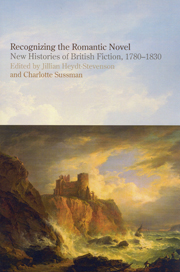Book contents
- Frontmatter
- Contents
- Acknowledgements
- Notes on Contributors
- Preface
- 1 ‘Launched Upon the Sea of Moral and Political Inquiry’: The Ethical Experiments of the Romantic Novel
- 2 Bad Marriages, Bad Novels: The ‘Philosophical Romance’
- 3 Enlightenment or Illumination: The Spectre of Conspiracy in Gothic Fictions of the 1790s
- 4 Burney's Conservatism: Masculine Value and ‘the Ingenuous Cecilia’
- 5 ‘All Agog to Find Her Out’: Compulsory Narration in The Wanderer
- 6 A Select Collection: Barbauld, Scott, and the Rise of the (Reprinted) Novel
- 7 Austen, Empire and Moral Virtue
- 8 Fanny Price's British Museum: Empire, Genre, and Memory in Mansfield Park
- 9 Between the Lines: Poetry, Persuasion, and the Feelings of the Past
- 10 Scholarly Revivals: Gothic Fiction, Secret History, and Hogg's Private Memoirs and Confessions of a Justified Sinner
- 11 Sympathy, Physiognomy, and Scottish Romantic Fiction
- Works Cited
- Index
6 - A Select Collection: Barbauld, Scott, and the Rise of the (Reprinted) Novel
- Frontmatter
- Contents
- Acknowledgements
- Notes on Contributors
- Preface
- 1 ‘Launched Upon the Sea of Moral and Political Inquiry’: The Ethical Experiments of the Romantic Novel
- 2 Bad Marriages, Bad Novels: The ‘Philosophical Romance’
- 3 Enlightenment or Illumination: The Spectre of Conspiracy in Gothic Fictions of the 1790s
- 4 Burney's Conservatism: Masculine Value and ‘the Ingenuous Cecilia’
- 5 ‘All Agog to Find Her Out’: Compulsory Narration in The Wanderer
- 6 A Select Collection: Barbauld, Scott, and the Rise of the (Reprinted) Novel
- 7 Austen, Empire and Moral Virtue
- 8 Fanny Price's British Museum: Empire, Genre, and Memory in Mansfield Park
- 9 Between the Lines: Poetry, Persuasion, and the Feelings of the Past
- 10 Scholarly Revivals: Gothic Fiction, Secret History, and Hogg's Private Memoirs and Confessions of a Justified Sinner
- 11 Sympathy, Physiognomy, and Scottish Romantic Fiction
- Works Cited
- Index
Summary
The art of fictitious narrative appears to have its origin in the same principles of selection by which the fine arts in general are created and perfected. […] Thus, in the process of time, a mass of curious narrative is collected, which is communicated from one individual to another.
– John Dunlop, The History of Fiction (1814)To the extent that literary periods define themselves by the works they canonize as well as by the books they print, the year 1774 should stand as a doubly conspicuous marker to Romanticists and to historians of genre. The year of Donaldson v. Beckett, the House of Lords' decision that ended perpetual copyright in Britain, 1774 saw fundamental changes in book production as publishers rushed to reprint titles suddenly thrust into the public domain. Representing the decision as nothing less than a wholesale assault on property rights, The Morning Chronicle of 23 February identified the magnitude of the loss: ‘By the above decision of the important question respecting copy-right in books, near 200,000 £. worth of what was honestly purchased at public sale, and which was yesterday thought property is now reduced to nothing’. With the term of copyright now set at twenty-one years and with a host of British writers from John Milton to James Thomson thrust into the public domain, Donaldson did more than affect the profits of British publishers; it directed their attention to British authors and away from foreign ones who, repackaged in the form of new translations, had previously been the staple of new editions, anthologies, and collections.
- Type
- Chapter
- Information
- Recognizing the Romantic NovelNew Histories of British Fiction, 1780-1830, pp. 155 - 191Publisher: Liverpool University PressPrint publication year: 2010
- 1
- Cited by



